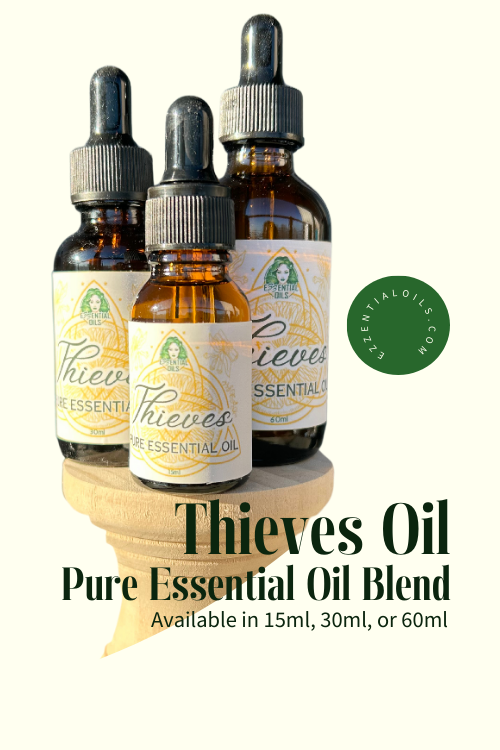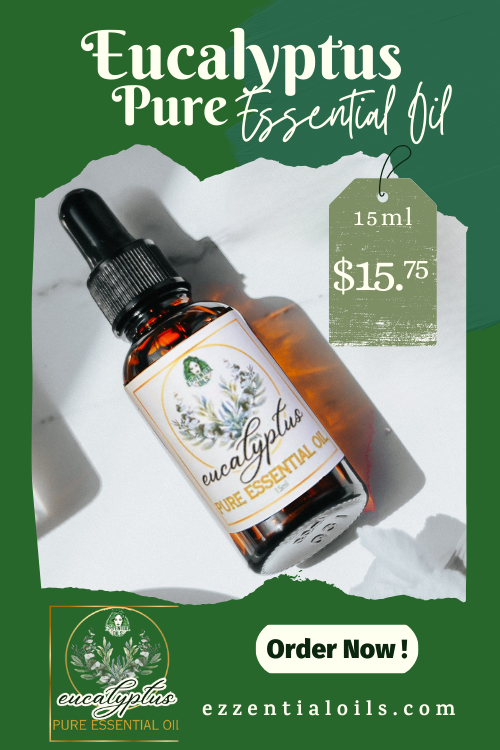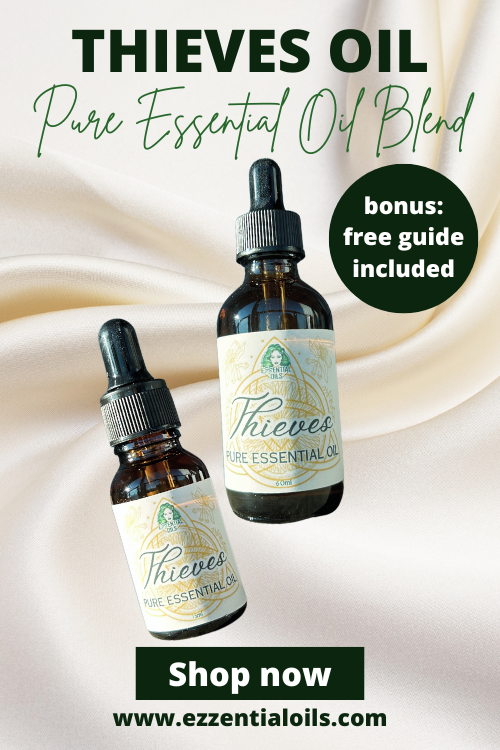Healing With Essential Oils:
Allergy Relief And Respiratory Wellness

Essential oils can be incredibly beneficial in managing allergy symptoms, offering a natural and supportive approach to ease discomfort.
When it comes to allergies, essential oils can play a remarkable role in alleviating symptoms. Many essential oils possess anti-inflammatory, antihistaminic, and decongestant properties, making them effective allies in managing allergic reactions. Oils like lavender, peppermint, eucalyptus, and tea tree are known for their potential to ease congestion, soothe irritated nasal passages, and reduce inflammation, offering relief from common allergy symptoms like sneezing, congestion, and itchy eyes.
Essential oils work by targeting various pathways in the body. For instance, peppermint oil is known for its ability to open up airways, making breathing easier for individuals experiencing respiratory discomfort due to allergies. Tea tree oil boasts antibacterial and antiviral properties, which can assist in clearing the air of potential allergens and supporting the immune system.
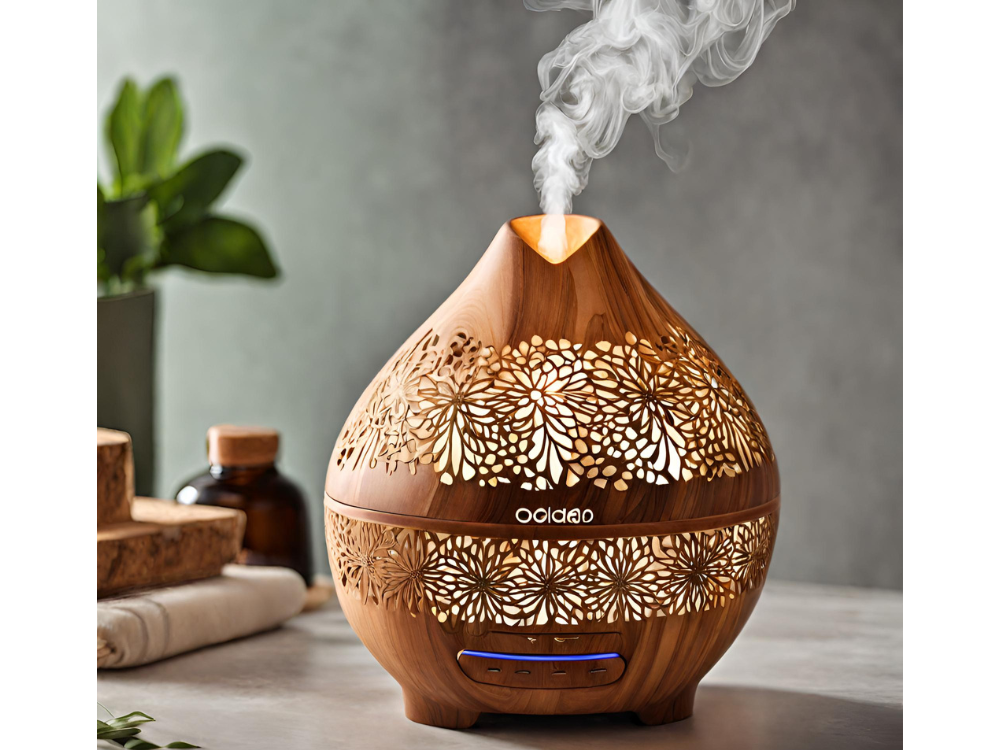 The use of essential oils for allergy relief often involves diffusion or topical application. Diffusing essential oils in the air helps purify the environment, reducing airborne allergens and providing relief from symptoms caused by pollen, dust mites, or pet dander. Additionally, topical application, when properly diluted, can be beneficial. Applying diluted oils to the chest or wrists allows for inhalation, aiding in clearing nasal passages and offering respiratory comfort.
The use of essential oils for allergy relief often involves diffusion or topical application. Diffusing essential oils in the air helps purify the environment, reducing airborne allergens and providing relief from symptoms caused by pollen, dust mites, or pet dander. Additionally, topical application, when properly diluted, can be beneficial. Applying diluted oils to the chest or wrists allows for inhalation, aiding in clearing nasal passages and offering respiratory comfort.
It's important to note that while essential oils can offer relief, they are not a complete cure for allergies. They serve as a complementary approach to conventional allergy management. Individuals with severe allergies should consult healthcare professionals before incorporating essential oils into their regimen, ensuring that these oils do not interact with existing medications or exacerbate allergy symptoms.
Understanding the potential of essential oils in managing allergies requires a cautious approach. Each person's sensitivity to oils varies, so it's crucial to perform patch tests before extensive use and to dilute oils properly to prevent skin irritation or sensitization. Furthermore, consistency in using oils can often yield the best results in managing allergic reactions.
While essential oils can aid in alleviating allergy symptoms, they should be used as part of a comprehensive allergy management plan. When used correctly and with consideration for individual sensitivities, essential oils can provide a natural and supportive means to ease discomfort associated with allergies.
Top Essential Oils For Allergy Relief
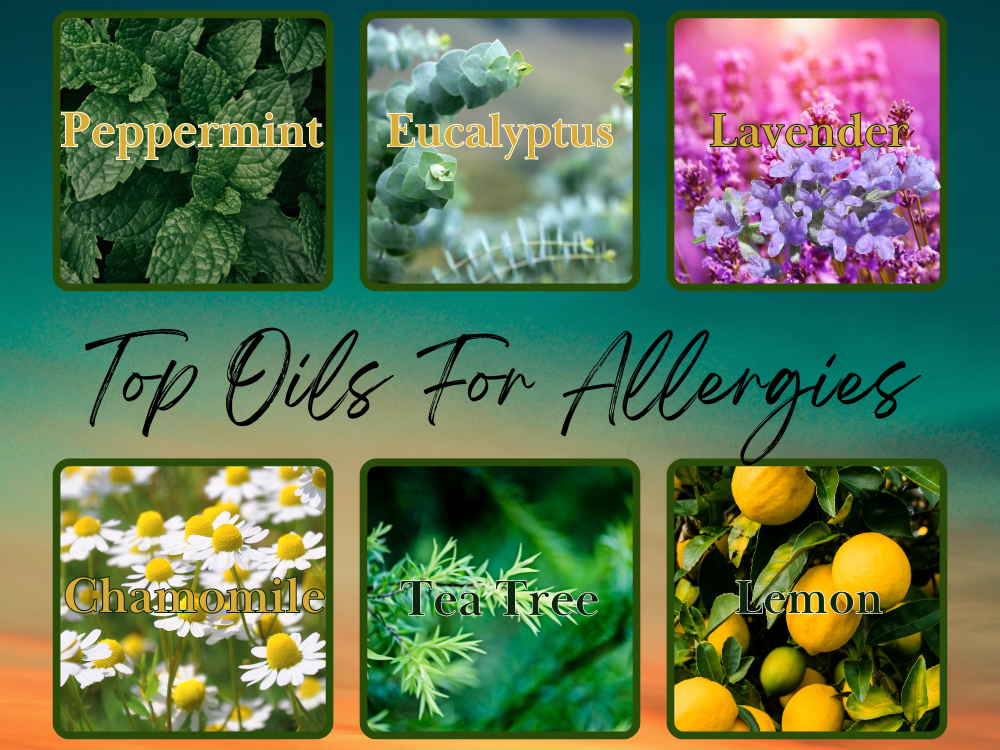
Several essential oils stand out for their potential in providing relief from allergy symptoms, offering natural support during challenging seasons.
Peppermint oil is a powerhouse when it comes to allergy relief. Its menthol content acts as a natural decongestant, aiding in opening up airways and easing breathing difficulties caused by allergies. Inhalation of diluted peppermint oil can help reduce nasal congestion, making it a go-to oil for alleviating respiratory discomfort during allergy season.
Lavender oil, known for its calming properties, can also be beneficial in managing allergy symptoms. While it doesn't directly combat allergies, its anti-inflammatory and soothing effects can ease skin irritation resulting from allergic reactions. Applied topically when properly diluted, lavender oil can offer relief from itching or irritation caused by allergic skin reactions.
Eucalyptus oil is often praised for its decongestant properties. The oil's compounds help clear nasal passages and support easier breathing, making it an excellent choice for individuals dealing with congestion due to allergies. When diffused or inhaled, eucalyptus oil can provide relief from respiratory symptoms associated with allergies.
Tea tree oil, with its potent antibacterial and antiviral properties, can assist in purifying the air. Diffusing tea tree oil helps eliminate airborne allergens, such as mold or bacteria, creating a cleaner environment that may reduce allergic reactions. Additionally, its anti-inflammatory nature can soothe skin irritation caused by allergic reactions when applied topically in diluted form.
Chamomile oil, particularly Roman chamomile, is renowned for its anti-inflammatory and calming effects. It can help soothe irritated skin and reduce allergic skin reactions when applied topically in a carrier oil. Moreover, chamomile oil's relaxing properties may offer relief from stress, which can often exacerbate allergy symptoms.
Lemon oil, derived from the peel of the fruit, possesses cleansing properties that can aid in purifying the air. When diffused, lemon oil helps eliminate allergens from the environment, contributing to a fresher and cleaner atmosphere. Its uplifting citrus scent also offers a refreshing aroma, making it an excellent choice for maintaining a pleasant environment during allergy season.
These essential oils, used thoughtfully and with proper dilution, can serve as natural allies in managing allergy symptoms. However, it's essential to remember that individual reactions to oils may vary, and consulting with a healthcare professional before incorporating essential oils into an allergy management plan is advisable, particularly for those with severe allergies or existing medical conditions.
DIY Allergy Relief Blends With Essential Oils
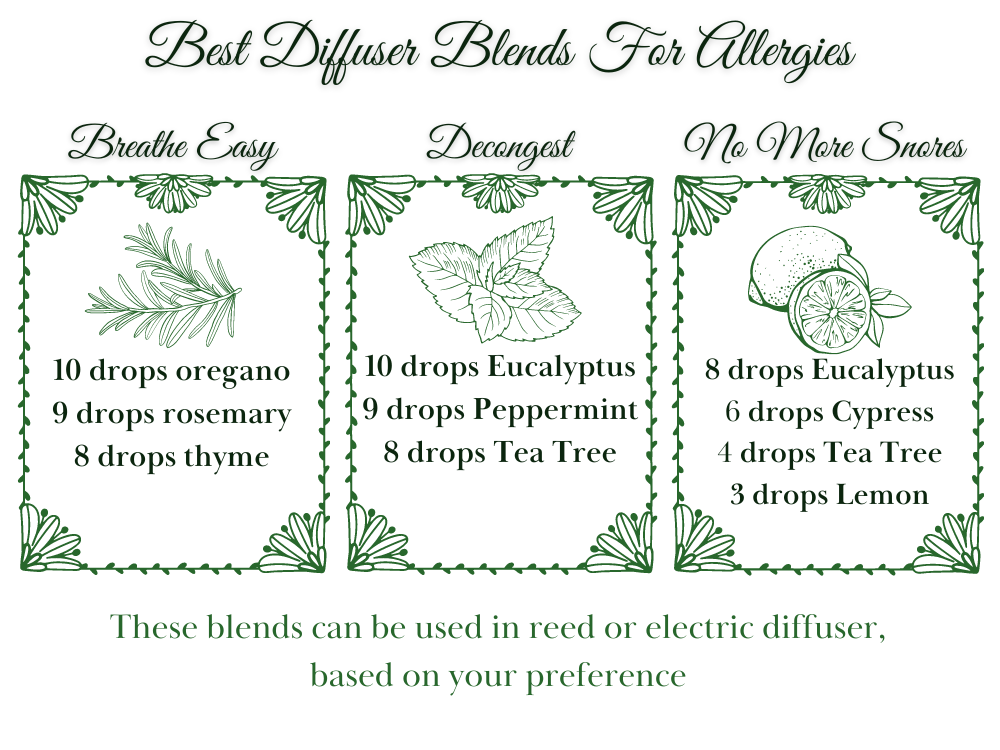 Creating custom essential oil blends for allergy relief can be an empowering way to personalize your approach to managing allergy symptoms. These blends can be tailored to address specific symptoms and offer holistic support during allergy seasons.
Creating custom essential oil blends for allergy relief can be an empowering way to personalize your approach to managing allergy symptoms. These blends can be tailored to address specific symptoms and offer holistic support during allergy seasons.
Start with a base oil like coconut, almond, or jojoba oil as a carrier. For respiratory relief, consider blending eucalyptus, peppermint, and lemon oils. Mix 2 drops each of eucalyptus and peppermint oil with 3 drops of lemon oil in 1 ounce of carrier oil. This blend, when applied to the chest or used in a diffuser, can help ease congestion and promote easier breathing.
To soothe skin irritations caused by allergies, a blend of lavender and chamomile can be effective. Combine 2 drops of lavender oil and 3 drops of chamomile oil in 1 ounce of carrier oil. Apply this mixture topically to affected areas after dilution to help calm and alleviate skin discomfort associated with allergies.
For a comprehensive blend targeting various allergy symptoms, consider a mix of tea tree, lavender, and eucalyptus oils. Combine 2 drops of tea tree oil, 2 drops of lavender oil, and 1 drop of eucalyptus oil in 1 ounce of carrier oil. This blend can be used topically on the skin or inhaled through diffusion for a broad-spectrum approach to allergy relief.
To combat environmental allergens, a blend of lemon, peppermint, and lavender oils can be beneficial. Mix 2 drops of lemon oil, 2 drops of peppermint oil, and 2 drops of lavender oil in 1 ounce of carrier oil. Diffuse this blend in your living or working space to purify the air and reduce allergens in the environment.
For those struggling with sinus pressure and congestion due to allergies, a blend of peppermint, eucalyptus, and tea tree oils may offer relief. Combine 2 drops of peppermint oil, 2 drops of eucalyptus oil, and 1 drop of tea tree oil in 1 ounce of carrier oil. Gently massage this diluted blend onto the chest or sinus areas for potential decongestant effects.
It's important to conduct a patch test before applying any essential oil blend to a larger area of the skin to ensure there's no adverse reaction. Additionally, always use properly diluted essential oils and consult with a healthcare professional, especially if you have any existing health conditions or are pregnant, before using these blends. Crafting personalized blends can be a fun and effective way to manage allergy symptoms naturally, but individual responses to essential oils can vary, so finding what works best for you is key.

Essential Oil Inhalation Patches for Allergy Support: Portable Solutions For On-The-Go Relief
Essential oil inhalation patches are fantastic portable solutions for managing allergy symptoms wherever you go. These patches are convenient and discreet, offering a simple way to benefit from the therapeutic properties of essential oils throughout the day.
To use these patches effectively, simply add a few drops of your preferred essential oil or a blend onto the fabric patch. Oils like lavender, peppermint, eucalyptus, and tea tree are popular choices for allergy relief due to their anti-inflammatory and soothing properties. These patches act as personal diffusers, allowing you to inhale the oils' aroma and experience their benefits while you're out and about.
The application of essential oils through these patches offers a gradual release of the oils' aroma, providing ongoing relief from allergy symptoms such as congestion, sneezing, or itchy eyes. They can be worn on clothing, placed on your pillow while you sleep, or discretely adhered to the skin for a more immediate effect.
The best part about these patches is their versatility. You can create custom blends tailored to your specific allergy concerns. For example, a combination of lavender, chamomile, and eucalyptus can help soothe both skin irritations and respiratory discomfort associated with allergies.
It's important to remember that these patches are for aromatic use only and should never come into direct contact with the skin. This precaution helps prevent potential skin irritation or allergic reactions, especially for those with sensitive skin. Additionally, ensure the oils are properly diluted before applying them to the patches.
Using essential oil inhalation patches for allergy relief provides a convenient and non-intrusive way to incorporate aromatherapy into your daily routine. They offer a discrete and effective method for enjoying the benefits of essential oils, allowing you to manage allergy symptoms with ease while maintaining your daily activities. Always consult with a healthcare professional if you have specific health concerns or conditions before using essential oils, especially in patch form.
Essential Oils in Allergy-Friendly Cleansers: Balancing Cleanliness and Allergy Care
Integrating essential oils into allergy-friendly cleansers can significantly contribute to managing allergens in your living space while keeping your surroundings clean and fresh. When formulating these cleansers, essential oils such as tea tree, eucalyptus, and lemon are excellent choices due to their antimicrobial and purifying properties. These oils not only help maintain cleanliness but also contribute to allergy management by reducing potential allergens in your home environment.
Tea tree oil, known for its antibacterial and antifungal properties, is a natural powerhouse in cleaning products. It can be added to homemade surface cleaners or laundry detergents to help eliminate allergens like dust mites or mold spores. Eucalyptus oil, with its refreshing scent and antimicrobial properties, is great for cleansing the air and surfaces, making it an ideal addition to allergy-friendly cleaners.
Lemon oil is another excellent option for allergy-friendly cleansers due to its fresh aroma and natural disinfectant properties. When combined with white vinegar, it creates an effective, non-toxic cleaner that can sanitize surfaces while reducing potential allergens.
When using these essential oils in allergy-friendly cleansers, it's crucial to dilute them properly to avoid skin irritation or allergic reactions. Creating a blend with the right proportions of essential oils and carrier ingredients ensures effectiveness without causing any adverse effects.
Incorporating these oils into your cleaning routine not only helps maintain a clean environment but also contributes to reducing allergens that may trigger reactions. They offer a natural alternative to commercial cleaners, allowing you to manage allergens effectively while avoiding harsh chemicals that could exacerbate allergy symptoms.
Always test a small area before using any new cleaning product to ensure compatibility with different surfaces. Additionally, remember that while essential oils can be beneficial for allergy management, they may not completely eliminate all allergens, so it's essential to maintain regular cleaning practices for optimal allergy relief. Consulting with a healthcare professional or allergist can also provide guidance on managing allergies effectively using essential oils.
Aromatherapy Diffusion for Allergy Relief
Using aromatherapy diffusion can be a game-changer in managing allergy symptoms effectively and naturally. Diffusers disperse essential oils into the air, offering a non-intrusive way to alleviate allergic reactions. Essential oils like lavender, peppermint, and eucalyptus can play a pivotal role in this practice due to their anti-inflammatory and decongestant properties.
Lavender oil, celebrated for its calming effects, can help reduce stress levels, which may alleviate allergy-related discomfort. When diffused, it contributes to a relaxing environment, potentially reducing the body's reaction to allergens.
Peppermint oil is known for its refreshing scent and ability to clear congested airways. Its menthol component provides a cooling sensation that can ease breathing difficulties associated with allergies when diffused in the air.
Eucalyptus oil, with its strong, refreshing aroma, can be especially helpful in relieving nasal congestion caused by allergies. Diffusing this oil can aid in clearing the airways, promoting easier breathing for those experiencing allergy-related symptoms.
When using a diffuser for allergy relief, it's essential to follow manufacturer instructions and avoid overusing essential oils. Using diffusers intermittently, for short periods, helps prevent overwhelming the space with the scent and provides a consistent but not overpowering aroma.
Keep in mind that while essential oils can offer relief, they might not eliminate allergens entirely. Therefore, it's crucial to combine diffusion practices with other allergy management strategies, such as regular cleaning, minimizing exposure to known allergens, and seeking professional medical advice for severe allergies.
Choosing high-quality, pure essential oils and maintaining the diffuser's cleanliness are crucial for effective and safe use. This practice can provide a natural way to create an environment that supports allergy relief, promoting a more comfortable and breathable space for individuals affected by allergies.
Allergy Relief Inhalers with Essential Oils: Convenient Tools For Respiratory Support
Allergy relief inhalers infused with essential oils offer portable and discreet respiratory support for individuals managing allergies. These inhalers, compact and easy to carry, contain specific essential oil blends aimed at providing relief from allergy symptoms whenever needed.
Crafted with carefully selected essential oils like chamomile, lemon, or tea tree, these inhalers target different allergy symptoms. Chamomile, renowned for its soothing properties, can help alleviate irritation in the respiratory system, making it an excellent choice for allergy relief inhalers.
Lemon oil, known for its refreshing scent, is often included in these inhalers to promote a sense of freshness while potentially aiding in easing congestion. Its invigorating aroma can provide a much-needed boost during times of allergic reactions.
Tea tree oil, with its powerful antibacterial and anti-inflammatory properties, is commonly used in inhaler blends for its potential to assist in clearing nasal passages and supporting respiratory health in allergic individuals.
Using an allergy relief inhaler is simple and convenient. Unscrewing the cap and inhaling deeply through the nostrils allows the essential oil blend to be inhaled, providing quick access to the soothing benefits of essential oils.
These inhalers can serve as a handy tool in managing allergy symptoms on the go, offering relief when encountering allergens outdoors or in environments where allergens are present. However, it's essential to use these inhalers as directed and to consult with a healthcare professional if experiencing severe allergy symptoms.
When considering these inhalers, choosing high-quality essential oil blends and ensuring proper storage to maintain the oils' efficacy are vital for optimal results. This approach offers a portable and discrete solution for managing allergy symptoms, providing a natural alternative to conventional treatments.
Essential Oils for Children's Allergy Relief: Safe and Beneficial Oils For Kids' Allergies

When it comes to managing children's allergies, essential oils can be gentle yet effective allies. Certain oils are safer and more suitable for kids, offering relief from allergy symptoms without the potential side effects of conventional medications.
Lavender oil stands out for its calming properties and its ability to help ease mild allergic reactions in children. Its gentle aroma may provide a sense of relaxation and assist in reducing symptoms like sneezing or itching, offering a soothing touch during allergy episodes.
Chamomile oil, particularly Roman chamomile, is another child-friendly option known for its anti-inflammatory and calming effects. It can help ease skin irritations caused by allergies, providing relief from itching and redness.
Eucalyptus oil, when appropriately diluted and used in moderation, can be beneficial for older children experiencing congestion due to allergies. However, it's crucial to be cautious with its use around younger children due to its potent nature and potential respiratory sensitivity.
Tea tree oil, renowned for its antibacterial and antiviral properties, might aid in disinfecting the air and surfaces to reduce allergens, making it a helpful addition to a child's environment during allergy seasons.
For children, it's imperative to dilute essential oils properly and adhere to recommended guidelines for safe use. Using a carrier oil like coconut or almond oil to dilute essential oils before applying them topically can ensure gentler and safer usage.
Always perform a patch test before applying any diluted essential oil to a child's skin to ensure there is no adverse reaction. Additionally, consulting with a pediatrician or a certified aromatherapist experienced in pediatric care can provide personalized guidance for using essential oils safely and effectively for children's allergies.
Soothing And Allergy-Alleviating Bath Recipes
Allergy relief baths using essential oils can offer a peaceful respite and help alleviate discomfort caused by allergies. Creating a soothing bath infused with carefully chosen essential oils can provide a relaxing experience while potentially easing allergy symptoms.
Eucalyptus oil, known for its decongestant properties, can be an excellent addition to an allergy relief bath. Just a few drops of diluted eucalyptus oil added to warm bathwater can help clear nasal passages and ease congestion, offering relief from allergy-related stuffiness.
Lavender oil, with its calming and anti-inflammatory properties, is another fantastic choice for allergy relief baths. Its soothing scent can help reduce stress while potentially alleviating skin irritations caused by allergic reactions, promoting a more relaxed state during allergy episodes.
Peppermint oil is renowned for its cooling sensation and ability to open up airways. A few drops of diluted peppermint oil in a bath can provide relief from nasal congestion and support clearer breathing, making it a useful addition to an allergy relief bath blend.
Chamomile oil, particularly Roman chamomile, is gentle and calming, making it suitable for allergy relief baths, especially for skin-related allergy symptoms. Its anti-inflammatory properties may help soothe irritated skin, reducing redness and itchiness.
When using essential oils in a bath, always ensure proper dilution to avoid skin irritation or sensitivity. Mixing a few drops of essential oil with a carrier oil like coconut or jojoba oil before adding it to bathwater helps disperse the oils evenly and reduces the risk of skin irritation.
Taking a 15-20 minute bath with these essential oil blends during allergy season can provide a comforting experience, offering temporary relief from symptoms. However, it's essential to consult a healthcare professional before use, especially for individuals with allergies, skin sensitivities, or other health concerns.
Creating A Healthy Indoor Atmosphere: Essential Oil Room Sprays for Allergy-Free Environments
Creating essential oil room sprays can contribute to maintaining an allergy-free environment indoors. These sprays are simple to make and offer a natural way to freshen the air while potentially reducing allergens.
Lemon essential oil is known for its purifying properties and fresh, clean scent. A room spray combining a few drops of lemon oil with water in a spray bottle can help refresh the air and potentially neutralize common allergens, promoting a cleaner indoor atmosphere.
Tea tree oil is renowned for its antimicrobial properties. Mixing a few drops of tea tree oil with water in a spray bottle creates a natural disinfectant spray that may help eliminate airborne bacteria, fungi, and mold spores that could trigger allergies.
Lavender oil, with its calming and anti-inflammatory properties, can be a wonderful addition to room sprays. Apart from its pleasant scent, it may help reduce stress levels and soothe allergy-related discomfort, creating a more relaxed environment.
Peppermint oil has an invigorating scent and potential decongestant properties. A room spray featuring diluted peppermint oil may offer a refreshing aroma while potentially easing nasal congestion and supporting clearer breathing indoors.
Eucalyptus oil, with its respiratory benefits, can be a valuable inclusion in room sprays. A mixture of eucalyptus oil and water sprayed in rooms may help create a more breathable atmosphere, potentially aiding in allergy relief by reducing congestion.
Always remember to shake the spray bottle before use to ensure the essential oils are properly mixed with water. Test the spray in a small area first to check for any adverse reactions or sensitivity. Additionally, pregnant individuals, children, and pets should be kept in mind, and it's advisable to consult a healthcare professional before use.
Supporting Respiratory Health And Aiding Breathing Difficulties
Essential oils can offer valuable support in managing respiratory discomfort caused by allergies, aiding in easier breathing and providing relief from congestion.
Eucalyptus oil is renowned for its ability to promote clear breathing. Its active compound, cineole, may help ease nasal congestion and support respiratory health. A few drops of diluted eucalyptus oil in a diffuser or steam inhalation can potentially alleviate allergy-induced breathing difficulties.
Peppermint oil is another excellent choice for respiratory support. Its cooling sensation and potential decongestant properties may help open up airways, making it easier to breathe. Diluted peppermint oil applied topically on the chest or used in a diffuser may offer relief from allergy-related breathing challenges.
Tea tree oil's antimicrobial properties might assist in managing allergies affecting the respiratory system. Using this oil in a diffuser or in steam inhalation could potentially help reduce airborne pathogens, offering relief from allergy symptoms like congestion and breathing difficulties.
Lavender oil, known for its calming effects, can also support respiratory health. Its potential anti-inflammatory properties might assist in reducing inflammation in the airways, potentially easing breathing difficulties caused by allergies. Diffusing lavender oil or adding it to a warm bath might promote relaxation and support better breathing.
Chamomile oil, especially Roman chamomile, has anti-inflammatory properties that may aid in soothing irritated airways. When used in a diffuser or through steam inhalation, chamomile oil might help ease respiratory discomfort and support clearer breathing during allergy flare-ups.
Always ensure proper dilution when using essential oils, especially for inhalation methods. Individuals with respiratory conditions or sensitivities should consult healthcare professionals before using essential oils. Essential oils should complement but not replace prescribed medical treatments for respiratory issues related to allergies.
Essential Oils for Skin Allergies and Irritations
Essential oils can offer soothing relief for skin allergies and irritations, providing natural solutions to manage discomfort and ease reactions.
Chamomile essential oil is renowned for its anti-inflammatory properties, potentially offering relief for skin irritations caused by allergies. Diluted chamomile oil applied topically might help calm redness, itching, and inflammation, making it a gentle choice for managing skin reactions.
Lavender essential oil is another versatile option known for its soothing effects on the skin. Its potential anti-inflammatory and antimicrobial properties may aid in reducing irritation and soothing allergic skin reactions. Diluted lavender oil can be applied topically to affected areas to potentially alleviate discomfort.
Tea tree essential oil is prized for its antibacterial and anti-inflammatory properties, making it a potential ally in managing skin allergies. Diluted tea tree oil might help alleviate itching, redness, and discomfort caused by allergic skin reactions when applied topically, but it's important to perform a patch test beforehand.
Peppermint essential oil, with its cooling sensation, might provide relief for itching and irritation caused by skin allergies. However, peppermint oil should always be well-diluted before applying it to the skin due to its potential potency and the risk of skin sensitivity.
Calendula essential oil is valued for its soothing and skin-repairing properties, potentially aiding in reducing inflammation and promoting skin healing. Diluted calendula oil might help soothe allergic reactions on the skin, supporting comfort and recovery.
Always remember to dilute essential oils properly before applying them to the skin, especially for allergic or sensitive skin types. Conduct a patch test on a small area of skin before using any new essential oil to ensure there's no adverse reaction. If skin allergies persist or worsen, seeking advice from a dermatologist or healthcare professional is advisable.
Allergy Relief Inhalers: Convenient Tools For Respiratory Support
Allergy relief inhalers infused with essential oils offer a convenient and discreet way to provide respiratory support, especially during allergy seasons or in environments with triggers.
These portable inhalers typically contain a blend of essential oils chosen for their potential respiratory benefits. Oils like eucalyptus, peppermint, and tea tree are commonly used for their potential decongestant and anti-inflammatory properties, offering relief for nasal congestion and breathing difficulties caused by allergies.
Eucalyptus oil, known for its ability to open up the airways, can be a key component in allergy relief inhalers. Its potential to reduce inflammation in the respiratory system might provide relief from congestion and ease breathing.
Peppermint oil, with its cooling sensation and potential ability to alleviate nasal congestion, is another popular choice for inhalers. Its menthol content might help clear the sinuses and support easier breathing during allergy episodes.
Tea tree oil, prized for its antimicrobial properties, might be included in inhalers to potentially assist in fighting respiratory infections that can exacerbate allergy symptoms. Its potential to reduce inflammation might also aid in easing allergic reactions.
To use these inhalers, individuals simply inhale deeply through the nostrils, allowing the natural vapors of the essential oils to reach the respiratory system. The convenience of these inhalers allows for on-the-go relief, making them a practical solution for managing allergy symptoms throughout the day.
While these inhalers offer a portable and easy-to-use method for allergy relief, it's important to note that individual responses to essential oils can vary. Some people might have sensitivities or allergies to certain oils, so it's advisable to test on a small area or consult a healthcare professional, especially for individuals with respiratory conditions like asthma.
Allergy Relief Roll-On Blends For Topical Application
Allergy relief roll-on blends offer a convenient and targeted solution for managing allergic reactions on the skin, providing a portable way to find relief from discomfort caused by allergies.
These roll-ons typically contain a combination of essential oils known for their potential soothing and anti-inflammatory properties. Oils like lavender, chamomile, and frankincense are often included in these blends for their calming effects on the skin.
Lavender oil, renowned for its gentle and versatile nature, might be a key component in these roll-ons. Its potential anti-inflammatory properties could help alleviate skin irritation caused by allergies, providing relief from itching and redness.
Chamomile oil, particularly the Roman variety, is known for its potential to calm and soothe irritated skin. Its anti-allergenic potential might offer relief to those with sensitive skin prone to allergic reactions.
Frankincense oil, valued for its potential anti-inflammatory properties, might be included in these blends to aid in reducing skin inflammation caused by allergic responses. Its potential to promote skin health might also contribute to soothing irritated skin.
The roll-on application allows for easy and targeted use on affected areas. Users can apply the blend directly to the skin, gently rolling the product over areas experiencing discomfort due to allergic reactions.
The portability of these roll-ons makes them a practical solution for managing allergy-related skin issues while on the go. However, it's essential to perform a patch test before using them extensively, especially for individuals with sensitive skin or those prone to allergies, to ensure compatibility with the oils in the blend. Consulting a healthcare professional is advisable, especially for severe or persistent allergic reactions.
Allergy-Friendly Skincare With Essential Oils
Creating allergy-friendly skincare routines with essential oils is a holistic approach to promoting skin health while navigating allergic sensitivities. These routines aim not only to soothe allergic reactions but also to support overall skin health.
Choosing essential oils known for their calming and anti-inflammatory properties is fundamental in crafting allergy-friendly skincare. Oils like tea tree, chamomile, and lavender are often preferred for their potential to soothe and reduce skin irritations caused by allergies.
Tea tree oil, renowned for its antimicrobial properties, might be a key player in allergy-friendly skincare. Its potential to cleanse the skin and combat bacteria could help prevent allergic reactions from escalating and support overall skin health.
Chamomile oil, particularly the Roman variety, is a popular choice for its gentle nature. Its anti-inflammatory potential may assist in calming allergic skin reactions, reducing redness, and soothing itchiness.
Lavender oil, valued for its versatile and calming properties, can be a valuable addition to allergy-friendly skincare routines. Its potential to reduce skin inflammation and soothe irritation caused by allergies may contribute to overall skin health.
These oils can be incorporated into various skincare products like cleansers, moisturizers, and serums, catering to different skin needs while offering allergy-friendly benefits. However, it's crucial to perform patch tests before using these products extensively, especially for individuals with known allergies or sensitive skin.
Combining these essential oils with carrier oils or gentle, hypoallergenic bases can create custom skincare solutions that support skin health, promote a balanced complexion, and potentially alleviate allergic reactions, all while being mindful of sensitivities. Consulting a dermatologist or skincare professional is advisable, especially for those with severe allergies or chronic skin conditions.
Essential Oils For Allergy-Induced Headaches
Essential oils can be a soothing remedy for allergy-induced headaches, providing relief from the discomfort associated with these symptoms. Peppermint oil, renowned for its cooling sensation, might offer relief from headaches triggered by allergies. Its menthol content could help alleviate tension and promote a soothing sensation when applied to the temples or forehead.
Lavender oil, prized for its calming properties, could also aid in easing allergy-induced headaches. Its potential to reduce stress and promote relaxation might alleviate headache symptoms related to allergies. A gentle massage with diluted lavender oil on the neck and shoulders could contribute to a sense of relief.
Eucalyptus oil, known for its ability to clear the sinuses, may be beneficial for allergy-induced headaches. Inhaling steam infused with a few drops of eucalyptus oil might help clear nasal passages and provide relief from headaches triggered by congestion due to allergies.
Chamomile oil, with its anti-inflammatory and calming properties, could offer relief from headaches linked to allergic reactions. A diluted mixture applied as a compress or inhaled through steam might help ease discomfort and soothe headache symptoms.
Frankincense oil, valued for its potential anti-inflammatory effects, could also contribute to alleviating allergy-induced headaches. Its calming properties might help reduce stress and tension, providing relief from headaches caused by allergic reactions.
It's important to use these oils with caution and ensure they are properly diluted before application. Performing a patch test and seeking guidance from a healthcare professional is advisable, especially for individuals with known allergies or sensitivities. Essential oils should not replace medical advice or prescribed treatments for severe headaches or underlying health conditions related to allergies.
Allergy Management for Seniors: Tailoring Relief For Aging Immune Systems
For seniors dealing with allergies, essential oils can offer gentle yet effective relief, considering the unique needs of aging immune systems. When it comes to essential oils for allergy management in seniors, a cautious approach is key. Oils renowned for their anti-inflammatory and calming properties, like lavender and chamomile, can be particularly helpful. These oils, when properly diluted, may aid in soothing allergic reactions without causing additional irritation to sensitive skin or respiratory systems.
Given the sensitivity of aging skin, it's crucial to dilute essential oils appropriately before applying them topically. Mixing a few drops of essential oil with a carrier oil like coconut or jojoba oil can create a safe blend for seniors. This ensures that the oils are gentle and less likely to cause adverse reactions on the skin.
Inhaling essential oils through diffusers can be a safe and effective way for seniors to benefit from their therapeutic properties. Oils like eucalyptus or peppermint, known for their decongestant and respiratory-supporting qualities, can be diffused in the living space to ease breathing difficulties caused by allergies.
When using essential oils for seniors, it's vital to consider any existing health conditions or medications they may be taking. Some oils might interact with medications or exacerbate certain health issues. Consulting a healthcare professional before using essential oils is wise, especially for seniors with underlying health concerns.
Maintaining a clean and allergen-free living environment is equally crucial for seniors with allergies. Using natural cleaning solutions infused with essential oils—such as lemon or tea tree oil—can help keep the home environment free from allergens, promoting better respiratory health for seniors.
Lastly, practicing moderation is essential. Seniors may be more sensitive to essential oils due to changes in skin sensitivity and overall health. Using oils in small amounts and observing any adverse reactions is advisable. The goal is to provide gentle relief without causing any discomfort or complications for the aging immune system.
Safety Information
Please note, the International Federation of Aromatherapists do not recommend that Essential Oils be taken internally, unless under the supervision of a Medical Doctor, who is also qualified in clinical Aromatherapy. In addition, Essential Oils must be properly diluted before use, in order to avoid any damages to property or adverse physical effects (including injury or bodily harm).
This article is for information purposes only. All Ezzential Oils products are for external use only unless otherwise indicated. This information is not intended to diagnose, treat, cure, or prevent any disease, and it should not be used by anyone who is pregnant or under the care of a medical practitioner. Please refer to our policies for further details, and our disclaimer below.






